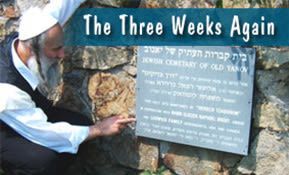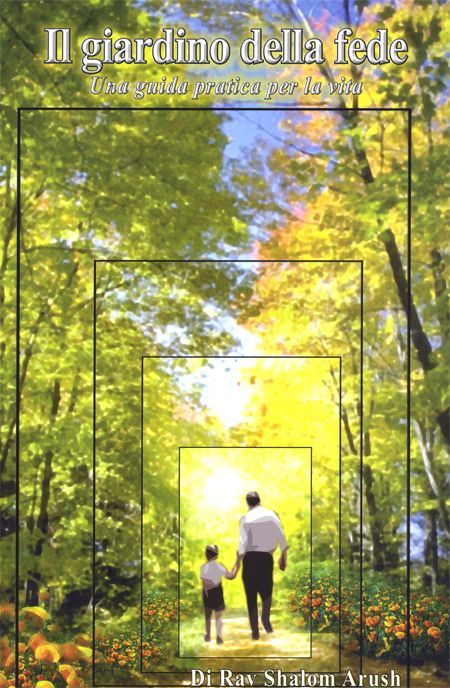
Why The Three Weeks?
To this day, we as a nation are still suffering. Why? Hashem said that the Jews would be punished for posterity because of crying, whining, and complaining…

The Three Weeks of calamity begin on the 17th of Tammuz and terminate on Tisha B’Av, the infamous date when the First and Second Holy Temples were destroyed, the Jews were expelled from Spain, and many more national disasters all the way down to the exile of our brothers from Gush Katif in 2005.
To this day, we as a nation are still suffering. Why? Hashem said the the Jews would be punished for posterity because of the crying, whining, and complaining following the Sin of the Spies. But is that fair? Why be punished for posterity because of one night’s crying? Let’s see…
Our forefathers coming out of Egypt complained and whined on several occasions. But, the complaint that broke the proverbial camel’s back was the baseless crying of the People of Israel upon hearing the words of the spies. The spies slandered the Land of Israel in the Book of Numbers (Parshat Shlach Lecha). “Then the  Holy One, Blessed Be He said: You have cried for no reason, I will give you something to cry about for generations!” The needless crying triggered a devastating punishment: Thousands of years of terrible exile, replete with suffering and hardship.
Holy One, Blessed Be He said: You have cried for no reason, I will give you something to cry about for generations!” The needless crying triggered a devastating punishment: Thousands of years of terrible exile, replete with suffering and hardship.
The punishment that the Creator decreed on the Jews because of the sin of the spies is shocking. Do the People of Israel throughout the generations really deserve such retribution just because they cried for one night for nothing? The destruction of two Holy Temples and the subsequent unspeakable torture and deaths of millions that have plagued the Jews throughout this prolonged, arduous exile? The Spanish Inquisition? Other tragedies throughout history, including pogroms and the Holocaust? Is that Divine justice?
Our own generation deals with troubles in clusters: massive international pressure threatening our homeland, terrible marital problems, diseases, traffic accidents, terror, and dire economic problems, may G-d have mercy. These are just the tip of the iceberg of this generation’s tribulations. Are the trials because the People of Israel needlessly cried once? Is that really so awful? After all, what did they do? They didn’t engage in debauchery, nor did they worship idols. All they did was cry. Must they suffer such reproof generation after generation? There is no sin in the Torah that invokes even a fraction of such bitter punishment!
The answer is amazingly simple: Hashem despises ingratitude more than any other sin. He can’t stand self-pity, either. Hashem is fully aware that people have evil inclinations and that they are encumbered by lusts. While disdained, these human faults don’t come close to the bad trait of ingratitude. Look at all the kindness that Hashem does for a person: He gives him life, showers him with goodness, and uplifts him from the sewers of promiscuity and bodily lusts. Hashem frees a person from the slavery of body and spirit. Hashem personally operates every part of us. Hashem feeds us every meal. After all the years filled with G-d’s salvation, that person is still crying? Baseless tears? Hashem then teaches that complaining and needless crying are the worst forms of behavior. Hence, the punishment for baseless crying is the greatest one of all.
The main reason that the punishment for crying needlessly in the desert continues is because we are still crying and complaining to this day. We continue to cry and complain about everything that doesn’t go exactly according to our wishes.
Today’s exile is not because of G-d’s anger thousands of years ago in the desert. It is because the Creator desires that we rectify this sin and completely uproot ungratefulness from our midst. As long as we have not rectified this negative trait, the exile and all its travails continue. In other words, we are not being punished for our tears in the past, but for the fact that we are still crying. In light of this, Hashem’s words: “I will give you something to cry about for generations,” mean that as long as the People of Israel cry, stern judgments, or dinim, are awakened, just like dinim the crying in the desert invoked. Therefore, if the Jews would uproot this terrible trait, the redemption would come immediately.
Why are ingratitude, baseless crying and not saying thank you the most serious sins that carry the bitterest punishments?
Even without Torah and its commandments, normal human decency obligates a person to appreciate what others do for him or her and express gratitude! Every person, with no exception, is required to be a fair and decent human. To paraphrase our sages, basic decency is a prerequisite for Torah.
We feel hurt and slighted when others deny the kindnesses and favors that we do for them. In fact, nothing upsets us more than ingratitude. Rabbi Akiva teaches, “Do not do to another what you, yourself, dislike.” If we find ingratitude so unsightly, then why should any of us be ungrateful to Hashem?
But, there’s no despair. We can correct this sin. We all have a solemn duty to learn, internalize and implement The Garden of Gratitude. This book is the light of Hashem that will certainly lead to each individual’s personal redemption quickly and easily, and ultimately to the national redemption and the rebuilding of our Holy Temple in the nearest future, amen!










Tell us what you think!
Thank you for your comment!
It will be published after approval by the Editor.